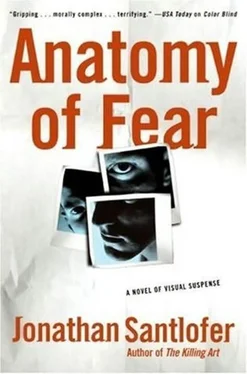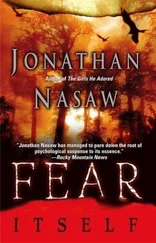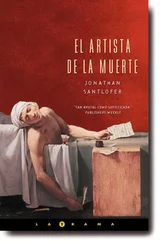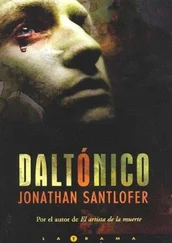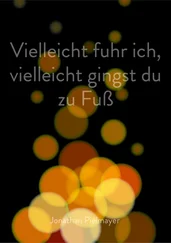I showed my ID and a guard sent me through. They were expecting me, thanks to Perez, who had called the warden, a long-time buddy.
I went through three checkpoints before a guard named Marshall, which struck me as ironic, met me. “Inmate you want is in UPD.”
“UPD?”
“Unit for the Physically Disabled. It’s over in C-Block, ground floor, ’cause of the wheelchairs.” Marshall was a large black man, affable, who kept up a running monologue as we headed over. He was proud of the jail, the dairy that was managed by the prisoners, and the profitable upholstery shop. He was full of information.
“Green Haven is New York’s only execution facility. Used to have the electric chair, but they exchanged it for lethal injection. Lot better, if you ask me.”
Neither option sounded good to me, but I nodded.
UPD looked more like a hospital than a prison: nurses’ station, doctors walking the hallways with clipboards.
Marshall stopped in front of a door, knocked, unlocked it, and waved me in.
“I’ll be right outside.” He closed the door behind me.
There was a man sitting in a wheelchair by a barred window; cheeks hollow, eyes sunken into sockets, skull visible beneath pale skin. I had seen Pedriera’s arrest sheet; he was only a few years older than me. But this guy looked about eighty. I thought Marshall must have made a mistake, but when I asked if he was Willie Pedriera he managed a nod. There was an IV in his arm, bruised and purplish welts on his skin. I recognized the illness.
“I’m Nate Rodriguez,” I said.
He turned his head toward me like a lazy lizard. “So…you’re the son.” His Barrio accent was strong. His eyes were rheumy and slightly unfocused; he was obviously doped on pain meds. “They told me you was coming.” He took a long, hard look at me. “You don’t look familiar.”
Now I remembered him. Julio had always bought the drugs, but there was one time I’d been with him. I reminded Pedriera, and he shrugged. “That why you’re here? To buy some weed?” He laughed and coughed, the veins in his forehead swelling. He wiped spit off his chin, and reached for a small one-legged figurine he had propped beside a wooden cross on the windowsill.
“You know Aroni, the midget healer?” he asked. “Has his work cut out for him with me, eh?”
“You should have Inle too, for healing,” I said. “And Babalu-Aye, who governs the sphere of illness. And Lubbe Bara Lubbe, who will take care of your past-and your future too.”
“I have no future,” he said, then squinted at me. “So, you are a believer?”
I didn’t have time to consider my answer. “Yes,” I said, and it seemed right to me.
He nodded, and closed his eyes, a faint smile on his lips.
“My friend, Julio Sanchez, you remember him?” I asked.
He took a minute. “Yeah…I remember.”
“He was with you that night.”
Pedriera sharpened. “Which night was that?”
“The night you killed my father.”
He shook his head slowly. “Not me.”
Even with his facial muscles in decline I could see he was lying, the corners of his mouth ticking up one second, down the next, zygomatic muscles tugging at his flaccid cheeks, but failing, the contradictions playing out on his face.
“That’s what I told those cops. I. Wasn’t. There. You hear me? Now…leave me alone. Can’t you see I’m dying?”
“Yes, I see that,” I said. “So why lie?”
“You think I should help those bastards?” His lip curled up in disgust. “I was eighteen the first time they locked me up. I sold some drugs, so what? They put me in with rapists and murderers.”
Because you are one.
“You see what they do to me?” He flicked a bony finger at his IV. “Why should I help them?”
“It’s not about helping them. ”
He waved a hand and it seemed to exhaust him. “Why should I help anyone? No one ever helped me. Never! Nunca! ” He laid his head back against the wheelchair and took a strangled breath, the chords in his neck like thick ropes.
“But this is your chance, Willie. Your last chance. To save your soul, your ori. ”
He closed his eyes and turned away, but I kept going.
“If you believe in Iku, then you know this is fate,” I said, and realized that I believed it too. “This is what was prescribed, the number of days you had written. My father’s number was cut short. You did that. You offended Ellegua and Chango and Oshun. All of them. Do you want your ori searching for a resting place forever? Don’t you want the gods to forgive you?”
He didn’t say anything for a minute and I didn’t either. I watched him struggle for breath and with something less tangible, perhaps his past. Then he leaned forward, reached out and gripped my hand. “Will you do something for me?”
I nodded, waiting.
“Bring me a madrina or a padrino. ” He drew in a breath and swallowed hard. “No, an espiritista, one with real powers, no fakes.” He locked his eyes on mine. “You can do that?”
“Yes.”
“Prometeme,” he said, his bony fingers tightening around mine.
I promised. I would drive Maria Guerrero here myself. I would pay her whatever she asked. I hoped the warden was as good a friend as Perez said he was and would allow it. I didn’t think they would deny a dying man his last wish, particularly in exchange for his testimony.
Then I got the guard, Marshall, to be a witness. He stood and listened while Pedriera told his story: how he’d sold drugs to the neighborhood kids, me and Julio included; and how my father had come to find him that night. It took a long time for him to get it out, coughing fits and gasps for breath interrupting him, and once, even tears. I transcribed every word, leading up to him firing the fatal shots that had killed my father.
“And what about Julio Sanchez?” I asked.
“He tried to stop me,” Pedriera said. “ Mas nada. He didn’t do nothing to your father.”
I made him say it again, and when he was finished he signed it and Marshall did too.
I promised again that I would bring the espiritista, and he told me to hurry.
The next day I drove Maria Guerrero to Green Haven. She stayed in Pedriera’s room for two hours and when she came out said that she did her best to cleanse him, but he would soon be dead. Then she returned my money.
Two days later Willie Pedriera was dead.
On the way back to Manhattan she told me she’d had a dream that I would find a man on fire. It reawakened the unsettling vision I’d had that day at the station when Denton dared me to look inside his head. It sent shivers down my spine and I told her about it. She told me not to worry, that I was still protected, but I should come to the bótanica for candles and herbs. I promised I would.
That night, inspired by her dream, I made a drawing of my vision.
It was different from the original. I hadn’t remembered seeing the valley when I’d first had the vision, but it had come to me while I was drawing. I even got out my red ink and added the blood I’d seen on his chest. It didn’t make sense-a burning man in a valley-but I thought I’d take it uptown and show it to my abuela and to Maria Guerrero to see what they’d make of it.
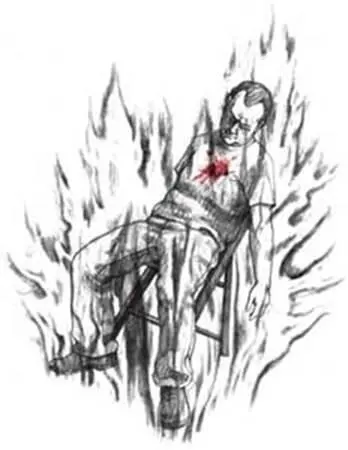
The next morning I got an unexpected call from Mickey Rauder, and went to his office.
The chief of operations patted me on the back and offered congratulations on a job well done. He asked how I was doing and I said fine. Then he asked if I was interested in working another case.
Читать дальше
